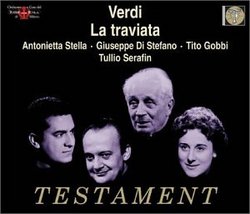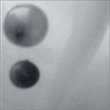| All Artists: Tito Gobbi, William Dickie, Giuseppe Verdi, Tullio Serafin, Elvira Galassi, Luisa Mandelli, La Scala Theater Orchestra, Orchestra del Teatro alle Scala di Milano, Antonietta Stella, Franco Ricciardi, Giuseppe Zampieri, Giuseppe di Stefano Title: Verdi: La Traviata Members Wishing: 0 Total Copies: 0 Label: Testament UK Original Release Date: 1/1/1955 Re-Release Date: 10/9/2001 Album Type: Import, Original recording reissued Genre: Classical Style: Opera & Classical Vocal Number of Discs: 2 SwapaCD Credits: 2 UPC: 749677221126 |
Search - Tito Gobbi, William Dickie, Giuseppe Verdi :: Verdi: La Traviata
 | Tito Gobbi, William Dickie, Giuseppe Verdi Verdi: La Traviata Genre: Classical
|
Larger Image |
CD DetailsSimilar CDs
|
CD ReviewsBeautiful, Underated Performance I. Martinez-Ybor | Miami, FL USA | 03/28/2008 (5 out of 5 stars) "This performance came and went in vynil, and Angel/EMI never bothered to reissue it on CD. Testament has now lovingly remastered it and launched it with ample program notes telling the interesting story of how the recording almost did not take place. One learns interesting facts about the early days of record distribution and the pitfalls of singers contracting with various companies, not to mention Callas' gratuitous spite against Serafin. This is a marvelous performance, probably the most satisfying commercial recording of the opera the Italian tradition has to offer. Serafin's conducting, far from the rushed-Toscanini frenzy, is not slow but flexible: he lets the music breathe, which, if anything, reinforces the highly dramatic passages which abound in this opera when they come. There is an appropriate air of melancholy permeating this reading which makes it unique. The musical lines, the ralentandos and accelerandos, are as apt as only a veteran of Maestro Serafin's stature could produce. The Scala orchestra strings have never sounded more beautiful. It is wonderful to have an all-Italian cast of principals, no peculiar accents or inflections to put up with here from anybody. Words sound like they should, and the dramatic pointing is genuine...... no cringing at vowels or consonants or misplaced syntax. Antonietta Stella had a solid, rich, lyrico-spinto sound, veiled in quality. Her tone production was equalized throughout her range, sizeable and accurate, quite up to the dramatic moments of the score, and managing the first act coloratura decently though not spectacularly (beloved Tebaldi could not manage it at all). Stella portrays Violetta as vulnerable but morally strong, with great dignity and dramatic power yet always managing to sound young. She must have been around twenty-five or twenty-six when the recording was made and most gratifyingly sounds it. The ultimate Violetta portrayal may be Callas' (LaScala and Covent Garden), but Stella is most satisfying. Giuseppe di Stefano is spectacular. There is no better performance of Alfredo on records up to now. He is in full command of his miraculous voice, one of the most beautiful lyrical instruments of the post-WWII period. Technique, ardor, beauty of sound, supreme musicality combine to produce an Alfredo who may be in love with Violetta but most certainly in love with love. The bounce in his voice in "Di Miei Volenti Spiriti" is truly youthful, the voice soaring and opening up on top with utmost ease and brilliance. One can see the smile in the face, smell the freshness in the country air. "Parigi O Cara" is a moment of melancholy tenderness, aided immensely, as everywhere else, by Serafin's understanding and love of the score. If for no other reason, the recording is worth purchasing for Di Stefano's performance alone. Tito Gobbi is the perfect Germont, even if his top is in spots a bit strained. The nuance he gives the conversational passages, particularly his marvelous scene with Violetta in Act II, is a lesson in singing-acting many other baritones singing the part could well learn. And of course, so important for many "conversational" passages in this opera, this is the genuine Italian chiaroscuro way with this score, for which there is no substitute, where words and notes are one. Males are deprived of their cabalettas as was customary when this was recorded (I like one verse of Alfredo's; Germont's should remain cut, it's ackward, uninspired if not ugly, and unnecessary). The Testament transfer is in flawless, clear, spacious mono. " Traviata on the slow side gaetano | NJ USA | 09/08/2005 (4 out of 5 stars) "I have this recording on vinyl on the original Angel label. I find the performance wonderful as a whole, but as much as I love Gobbi I have to admit he has some problems with a "hooty" top. Di Stefano and Stella are in great form, but Maestro Serafin's tempi seem a bit slow to me. I highly recommend this performance to anyone who loves great singing and interpretations."
|

 Track Listings (24) - Disc #1
Track Listings (24) - Disc #1

